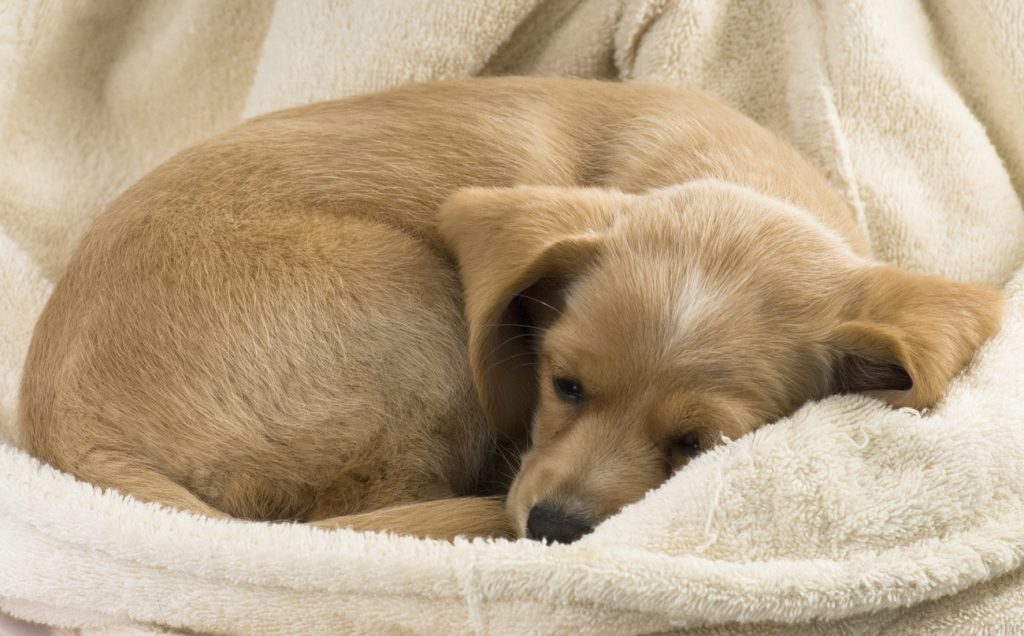- Not a substitute for professional veterinary help.
Dogs certainly make our hearts spin—and, sometimes, our heads spin, too—with their behaviors. But what makes our dogs spin? Whether chasing their own tail or training to spin, dogs circling is a quirky characteristic found in many of our four-legged family members. One such common spin ritual is taking a spin before plopping into bed and curling up for a nap. So, if you’ve ever noticed this and thought, “Why does my dog spin before they lie down?” read on!
When it comes to dogs spinning before lying down, you may ask yourself: is this behavior normal? What does it mean? Does it make my dog more comfy?
We looked into the research, plus spoke with a dog behavior expert—Los Angeles-based author and Certified Professional Dog Trainer, Nicole Ellis—to find out why dogs love to spin before lying down—and what it means.
Why Do Dogs Spin Before They Lie Down?
Dogs like to spin before lying down for a few reasons, including their own instincts and comfort. Let’s examine the science behind dogs’ spins and when spinning is cause for concern.
1. Spinning on Instinct
If you’ve ever wondered why your dog likes to spin around as they flop into a cushy bed, you may be surprised to learn that your dog’s wild instincts may play a role. “There’s some studies that think maybe it could go down to pack mentality,” says Ellis. The theory is that pack animals circle before sleep to assess that all members of the pack are accounted for and there are no predators about before settling down. Ellis says similar behaviors have been observed in wolves, foxes, and coyotes, in addition to dogs.
Animals in the wild, notes Ellis, can be seen spinning, squishing down the grass before lying down. “Sometimes dogs, and other animals, will dig and spin when they’re outdoors, because the ground slightly out of the sun is going to be cooler,” she says. This can make dogs more cool and comfortable by adjusting their body temperature when lying down outside.
2. Gettin’ Cozy
And while some dogs may spin to achieve cooler ground for their bodies before lying down, the opposite can be true as well. Ellis says her dog who runs hot tends not to exhibit spinning before lying down behavior. But her other dog loves blankets and curling up into a tight ball.
If you think about it, spinning helps get the body into a ball formation. This sleeping position helps dogs maintain body heat, and it’s not uncommon to see wild canids curl up tight together with their pack. So, you may see this behavior in dogs that run a little colder or dogs that originate from cold climates.
But, just like people, it could also be that your dog just likes to get cozy. As Ellis says, they’re “making a bed, working out their blankets, and getting comfortable.” Think of it as your dog positioning pillows and arranging blankets before going to sleep.

3. The Bed Could Be Key – And Your Dog Could Be Uncomfortable
We hate to break it to you, but maybe your dog’s ritual of spinning around before lying down says more about the bed they’re working with than them.
“Sometimes, it depends on what they’re lying on,” says Ellis. “Like a squishy bed versus somewhere hard. We don’t usually see [spinning before lying down], on the hard floor as often.”
A senior dog or a large-breed dog may also exhibit this behavior, and require a bed more specifically for their needs. “With some larger dogs, there’s more weight put onto their elbows and other joints when they’re laying on the ground. So maybe it might take them a minute more to find a comfortable spot,” says Ellis. “Giving them a nice, comfortable bed, and some blankets to lay on, could help alleviate those problems and we might see a difference in how quickly they lie down.”
When to be Concerned
As we’ve discussed above, there are normal reasons for dogs to take a spin before lying down. But, there are also some instances in which spinning behavior may indicate something’s wrong. It’s especially important to keep an eye on senior dogs who exhibit spinning and circling behaviors.
Ellis says it’s possible that spinning before flopping down could give dogs something to focus on if they are feeling stressed or insecure. “When our dogs are spinning, we need to like ask ourselves, is this a new, random behavior? Or is this something they’ve been doing?” If spinning comes on suddenly, it’s important to consult a veterinarian right away, as your dog may be experiencing a neurological, or other medical, issue.
It’s also important to pay attention to how they’re spinning. If it’s a few spins straight into laying down, that’s fairly common, but being unsettled after spinning is another story. “So, if they’re spinning—they get down, they get up, they get down, they get up—that is a sign that something could be wrong medically, when they’re unable to get comfortable,” says Ellis.
If a dog’s spinning behavior is accompanied by signs of distress or discomfort, be sure to consult your veterinarian to help get to the bottom of the issue.
Bottom Line
Ah dogs, they’re just like us! They like a comfy spot to lie down, and to feel safe and cozy when they do. They may also be channeling their wild canid genetics and instincts before plopping down on that super deluxe, not so outdoorsy, bed you spent an arm and a leg on.
However, it’s important to ask yourself: Is this a ritual behavior? Quick? Are they happy and comfy? Or is the spinning drawn out? Are they stressed or uncomfortable? Be sure to pay attention to the bigger picture when your dog spins before laying down—and consult medical or behavioral professionals if you have any concerns.
